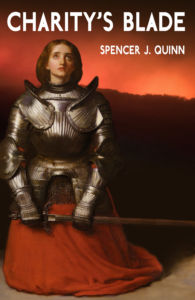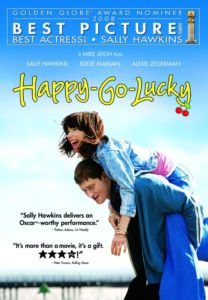(((Happy-Go-Lucky)))
Posted By Spencer J. Quinn On In North American New Right | Comments DisabledAny doubt that there is a concerted wish among influential Jews to guide gentiles into maladaptive behavior can be dispelled by watching the 2008 Mike Leigh film Happy-Go-Lucky. The British Leigh, whose family name was originally Lieberman, became famous as a director among the avant-garde crowd in the 1990s with true-to-life comedy-dramas such as Life is Sweet, Naked, and Secrets and Lies. As an actor’s director, Leigh typically relies more on improvisation and dialogue than on action or cinematography. In other words, his films are chatty, and in many ways harken back to the stage — albeit a long-winded, cockney version of one. At least that’s how Leigh was by 2008, when Happy-Go-Lucky came out.
This film is so offensive that I will provide spoilers in the most prejudicial manner possible. If there ever was a film deserving of being culture-of-critiqued as an insidious attempt at Jewish evolutionary strategizing (by encouraging dysgenic behavior among gentiles), this is it. Examples will appear where appropriate, hyphenated and, of course, in triple parentheses.
A 30-year-old, unmarried elementary school teacher named Pauline “Poppy” Cross, played by Sally Hawkins, cannot shut up with her inane small talk. From her wacky dress, clattering jewelry, cluttered London flat, lack of romantic interests, and overall unmoored lifestyle, we can tell she is some kind of free spirit — and her unswervingly chipper demeanor tells the audience that this is a good thing. (((Don’t get married. Don’t have children.))) One day she discovers that her bike was stolen, but is too kindhearted to get upset or look for the perps. (((Don’t be selfish. Let minorities steal what belongs to you.)))
She decides to learn how to drive and meets her new driving instructor, Scott, unforgettably played by Eddie Marsan. We see the disparity between the two right away. While she is irrepressible, open-minded, and ditsy, he is dour, reactionary, and — most importantly — perceptive. He scolds her incessantly about not driving safely and having a general lack of regard for the rules of the road. He also has unflattering opinions of non-whites and remarks on the Great Replacement as it is happening in London in real time. At one point he quite rightfully complains about how the London police ignore drug-dealers on the streets. This causes him to rant and seethe. (((Don’t be racist. It makes you unhappy.)))
Over the course of the film we learn that Scott believes there is some kind of secret plan behind it all. (((Don’t connect the dots. It makes you crazy.))) He soon unburdens himself of all his far-fetched — and curiously Christian — conspiracy theories, which makes him seem even more unhinged. (((Don’t be a Christian. It makes you crazy.))) Scott is lonely and attracted to Poppy, but clearly has no chance with her. (((Don’t be a racist. Racists are losers.))) He doesn’t take this very well and rage-stalks her when she develops an interest in another man. (((Racists are also psychopathic criminals.)))
 [2]
[2]You can buy Spencer J. Quinn’s novel Charity’s Blade here. [3]
Beyond her relationship with Scott, nearly every situation Poppy finds herself in becomes a lesson for gentiles — especially gentile women — on all the perks of maladaptive, anti-evolutionary behavior. Early in the film Poppy has a long chitchat with a non-white friend in a restaurant. This scene has no bearing whatsoever on the plot, such as it is. Leigh had no reason to include it other than to make the audience like his muddle-headed heroine for having non-white friends. (((Don’t be racist. You’ll be popular.)))
Another jaunt in this meandering narrative occurs when Poppy develops a pain in her back. She visits a black immigrant doctor who takes care of her lickety-split. Again, no relevance to the plot. (((Always trust the competence of black people. They are just as smart as everyone else.))) Yet another irrelevant scene occurs when Poppy finds herself alone in a sketchy part of town at night. She meets a disheveled homeless man and, instead of running away like any sensible person would, compassionately engages with him. (((By all means, speak with down-and-out strangers at night when you’re all alone. What could possibly go wrong?)))
The most obnoxious scenes for me occur when Poppy visits her sister Helen. Unlike Poppy, Helen is married and pregnant. She also speaks a whole lot of sense to her wayward sister. For example, she tells Poppy to take life more seriously, not drink so much, and prepare for a future. Helen is literally the only character in the film with a substantial speaking role who has her life in order. The audience should sympathize with her, no?
Well, no, actually, since director Leigh prefers to paint Helen as judgmental, condescending, and intolerant. We can’t be sympathetic to that, can we? Not when it threatens the precious freedom of our spinster protagonist, who has no goals in life and no plans for her future whatsoever. (((You are an individual. Live for today.)))
Happy-Go-Lucky does have some redeeming qualities. Hawkins’ performance was spot on, and (my God) so was Marsan’s. Also, as a near-perfect example of Jewish subversion, this film is uniquely instructive, so it has that dubious distinction going for it as well.
To be fair, there is an admirable subplot in which Poppy intervenes on behalf of one of her male students. The boy is bullying other children, and instead of punishing him — or demonizing him and his family the way J. K. Rowling did with the Dursleys in Harry Potter — she applies her customary concern. She gets a social worker on the case and learns that his mother’s boyfriend has been beating him. Just getting the boy to admit this is a triumph, and soon, things are looking up for him. It was sweet, I have to admit. Poppy’s empathy for the child was depicted well by Hawkins, and Leigh played everything about it admirably straight.
You can say a lot of negative things about the Poppy Cross character, but insensitivity is not one of them. The child being white also makes Leigh’s decision not to henpeck gentiles over him a welcome surprise.
But this was a faint ray of light in an exceedingly sinister and nihilistic film. The Scott character in many ways represents both the best and worst of it. Through him, Leigh attempts to paint a type of person he does not like in the worst possible light. It’s not enough that Scott is a thought criminal; Leigh puts him on the verge of being a real one as well. But Eddie Marsan, it seems, played Scott a little too well in Happy-Go-Lucky. He tapped into something elemental in the European mind. Scott resents all the foreign intrusions into his country and looks to arcane Christianity for answers, since that is all he has. His frustration is all too real and, for today’s dissident Right, all too familiar [4]:
You can laugh while Rome is burning, but believe you me, Poppy, it is burning, and if you don’t wake up, then you will be burnt to a cinder. I mean, look around you, what do you see? Do you see happiness? Do you see a policy of bringing happiness to people? No. No. You see ignorance and fear. You see, you see the disease of multiculturalism. And what is multiculturalism? Multiculturalism is non-culturalism. And why do they want non-culturalism? Because they want to reduce collective will. The American dream never happened. The American nightmare is already here. I mean, look at the Washington Monument. It is 555 feet above the ground and 111 feet below the ground. 555 plus 111 is 666. Six-six-six, Poppy! Six-six-six!
What a cheap trick: discrediting perfectly reasonable concerns about multiculturalism by linking them to batshit crazy theories about the Washington Monument and the Book of Revelation. Thanks to Mike Leigh and his Jewish evolutionary messaging, Happy-Go-Lucky ends up being one cheap trick after another — but once you culture-of-critique it, everything makes sense. The tricks don’t come off as merely cheap, but also dirty.
* * *
Counter-Currents has extended special privileges to those who donate $120 or more per year.
- First, donor comments will appear immediately instead of waiting in a moderation queue. (People who abuse this privilege will lose it.)
- Second, donors will have immediate access to all Counter-Currents posts. Non-donors will find that one post a day, five posts a week will be behind a “Paywall” and will be available to the general public after 30 days.
- Third, Paywall members have the ability to edit their comments.
- Fourth, Paywall members can “commission” a yearly article from Counter-Currents. Just send a question that you’d like to have discussed to [email protected] [5]. (Obviously, the topics must be suitable to Counter-Currents and its broader project, as well as the interests and expertise of our writers.)
To get full access to all content behind the paywall, sign up here:
Paywall Gift Subscriptions
 [6]If you are already behind the paywall and want to share the benefits, Counter-Currents also offers paywall gift subscriptions. We need just five things from you:
[6]If you are already behind the paywall and want to share the benefits, Counter-Currents also offers paywall gift subscriptions. We need just five things from you:
- your payment
- the recipient’s name
- the recipient’s email address
- your name
- your email address
To register, just fill out this form and we will walk you through the payment and registration process. There are a number of different payment options.
